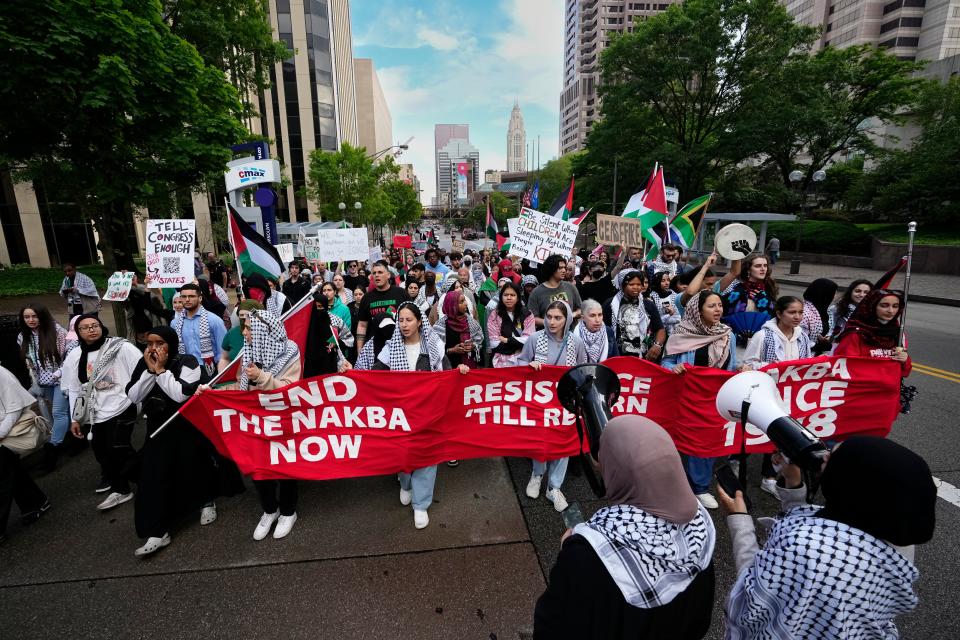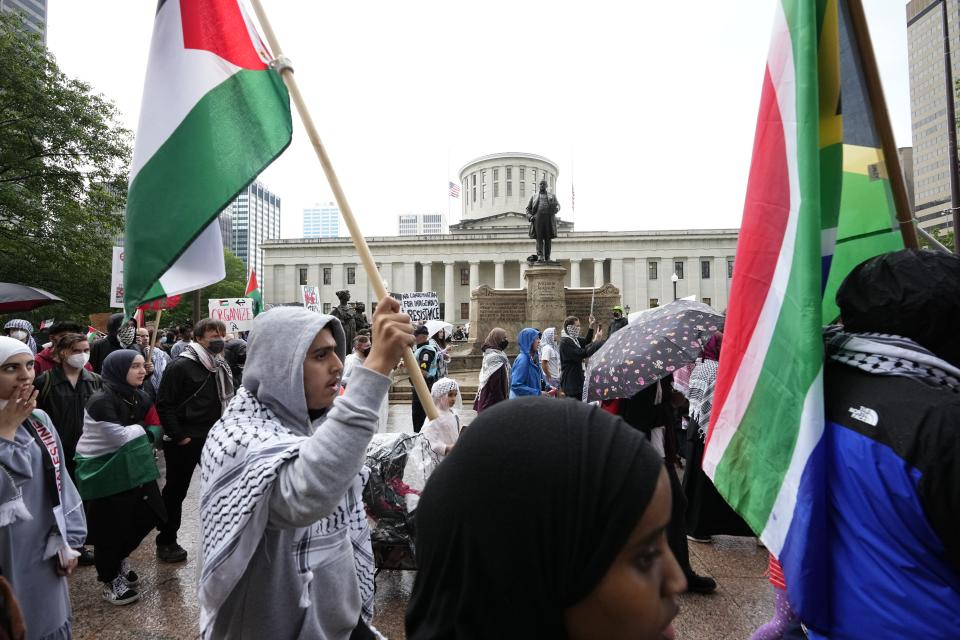Pro-Palestine demonstrators commemorate 'Nakba,' snarling traffic Downtown
- Oops!Something went wrong.Please try again later.
Suhail Zidan, a Palestinian American Columbus resident, stood before a crowd outside the Ohio Statehouse on Wednesday afternoon, and spoke about events that occurred 76 years ago.
Zidan said his maternal grandparents were driven from their homes in 1948 by militias, and never allowed to return. His paternal grandparents were able to return, but their land was confiscated from them, he said.
"We can never forget," he said.
A crowd that at its peak reached more than 350 — including students carrying backpacks, hospital workers still in their scrubs and others wearing the Palestinian keffiyeh head wrap — gathered Wednesday afternoon at the Statehouse to commemorate the 76th anniversary of the "Nakba," or the displacement of Palestinian Arabs who were living in what is today Israel. Many of the displaced Palestinians have been living as refugees for generations in Gaza and the West Bank, as well as in Syria, Jordan and Lebanon.

The Students for Justice in Palestine (SJP) chapters at Ohio State University and the University of Cincinnati, as well as several other organizations, led the protest. They called for an immediate ceasefire in the Israel-Hamas war in Gaza and an end to U.S. support for what they called "settler colonialism" by Israel.
“We just want to raise awareness that this is not an Oct. 7 issue; this has been going on for 76 years,” said Heba Latif, a Palestinian American and one of the organizers for the SJP chapter at Ohio State. “We're learning from our history and the genocide that’s happening now is very similar, and we ... want to call (for) an end to the ... occupation.”
SJP has organized previous protests at Ohio State and the University of Cincinnati, including one in April at OSU where Ohio State police and Ohio State HIghway Patrol troopers arrested 36 people.
But on Wednesday, Columbus police made no arrests. Protesters gathered around 3 p.m. at the Ohio Statehouse and were peaceful as they listened to speakers and demonstrated. About 4:30 p.m., organizers led protesters in a march north on North High Street, disrupting traffic for over an hour during the evening commute in Downtown and the Short North.
Sgt. Steve Dyer, a member of the Columbus Division of Police dialogue team, said the demonstrators had a permit to stage a protest at the Statehouse, but not to march on city streets. Police reacted to accommodate the march, providing an escort and diverting away a small group of counter-protesters from the marchers to prevent issues, he said.
Dyer said demonstrators were asked to move over to one lane of traffic, but the protesters occupied both lanes of traffic in defiance of police. Some motorists who saw the marchers coming did three-point turnarounds or U-turns, which also are illegal in the city.
Mazen Rasoul, a Columbus attorney and one of the protesters, told The Dispatch that he believed the request by Columbus police for protesters to stick to one lane on North High was an attempt to end the protest early.
Dyer said asking the protesters to move into one lane on North High was for their safety.
As they marched down the streets, protesters repeated some controversial chants, including: “From the river to the sea, Palestine will be free,” and “Say it loud, say it clear, we don’t want no Zionists here.”
At Buttles Avenue, the protesters turned west off North High, and marched to the north end of Goodale Park. They then turned south along Park Avenue before coming back to North High Street and turning south back toward Capitol Square.

Rain began to fall on the marchers as they headed south on North High, and as they approached Capitol Square at Broad and High streets the skies opened up with a heavy deluge. The number of demonstrators dropped dramatically, though about 80 remained when they arrived back at the Statehouse to continue their protest. Protesters thanked the organizers and the demonstration ended just after 7 p.m.
State Rep. Munira Abdullahi, a Columbus Democrat who attended Wednesday's protest, announced plans to introduce a bill in the Republican-controlled Ohio General Assembly to repeal a law that prohibits state agencies like universities from boycotting or disinvesting from Israel.
“That barrier is unfair to force American companies, Ohio companies, to invest in companies they don't want to invest in," she said. "We don't owe allegiance to a foreign country so when there is a social need that arises to boycott and divest, companies should be allowed to do that.”
Abdullahi, a Muslim and president of the Ohio Democratic Women's Caucus, attended the earlier protest on the Ohio State campus where 36 people were arrested and afterward denounced police force use to remove an encampment during Muslim prayer. "I was grabbed by my headscarf. I was pushed toward the ground on to students," she said on her state website. "Ultimately, I sustained painful bruising around my ribs and midsection."
During the Statehouse protest on Wednesday, Abdullahi went on her X account (formerly Twitter) and criticized the size of the police presence.
How come i don’t see this same energy and police presence when all the other folk are protesting on the Statehouse lawn. What a damn shame.
1st Amendment protections where? 👀— Rep. Munira Yasin Abdullahi (@muniraforohio) May 15, 2024
"How come I don't see the same energy and police presence when all the other folk are protesting on the Statehouse lawn," she tweeted. "What a damn shame. 1st Amendment protections where?"
Around 35,000 people have been killed in Gaza, according to the Gaza health ministry, and around 1.7 million people have been displaced since the Israeli military offensive, which now centers on the southern Gaza city of Rafah. The Israeli offensive followed Hamas' Oct. 7 attack on Israel, during which nearly 1,200 people were killed and some 250 were taken hostage.
@ShahidMeighan
ABayo@dispatch.com
This article originally appeared on The Columbus Dispatch: War in Gaza: Pro-Palestine protesters march through Columbus streets

